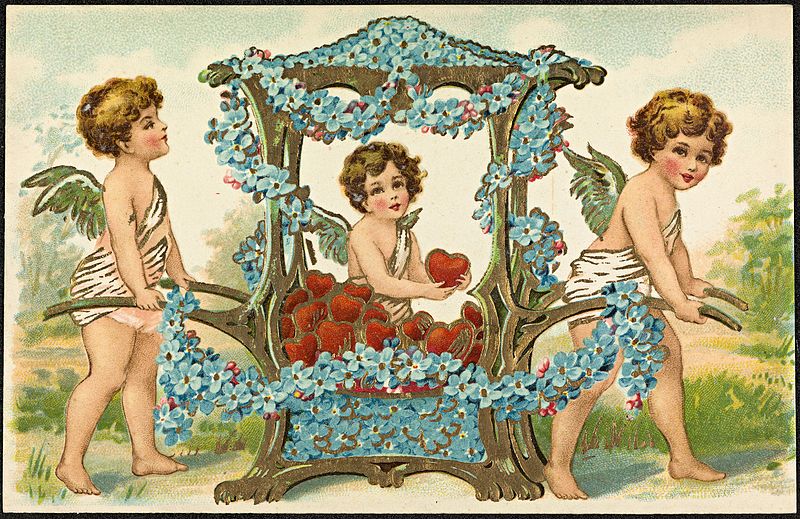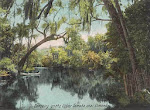from The Shepheardes Calender, 1579:
Julye [. . . continued from part 1]
[THOMALIN. MORRELL.]
Thom. Shepheards they weren of the best,
And lived in lowlye leas:
And sith theyr soules bene now at rest,
Why done we them disease?
Such one he was (as I have heard
Old Algrind often sayne)
That whilome was the first shepheard,
And lived with little gayne:
As meeke he was as meeke mought be,
Simple as simple sheepe,
Humble, and like in eche degree
The flocke which he did keepe.
Often he used of hys keepe
A sacrifice to bring,
Nowe with a kidde, now with a sheepe
The altars hallowing.
So lowted he unto hys Lord,
Such favour couth he fynd,
That sithens never was abhord
The simple shepheards kynd.
And such, I weene, the brethren were
That came from Canaan,
The brethren twelve, that kept yfere
The flockes of mighty Pan.
But nothing such thilk shephearde was
Whom Ida hyll dyd beare,
That left hys flocke to fetch a lasse,
Whose love he bought to deare.
For he was proude, that ill was payd,
(No such mought shepheards bee)
And with lewde lust was overlayd:
Tway things doen ill agree.
But shepheard mought be meeke and mylde,
Well eyed as Argus was,
With fleshly follyes undefyled,
And stoute as steede of brasse.
Sike one (sayd Algrin) Moses was,
That sawe hys Makers face,
His face, more cleare then christall glasse,
And spake to him in place.
This had a brother, (his name I knewe)
The first of all his cote,
A shepheard trewe, yet not so true
As he that earst I hote.
Whilome all these were lowe and lief,
And loved their flocks to feede,
They never stroven to be chiefe,
And simple was theyr weede.
But now (thanked be God therefore)
The world is well amend,
Their weedes bene not so nighly wore;
Such simplesse mought them shend:
They bene yclad in purple and pall,
So hath theyr God them blist,
They reigne and rulen over all,
And lord it as they list:
Ygyrt with belts of glitter and gold,
(Mought they good sheepeheards bene)
Theyr Pan theyr sheepe to them has sold;
I saye as some have seene.
For Palinode (if thou him ken)
Yode late on pilgrimage
To Rome, (if such be Rome) and then
He sawe thilke misusage.
For shepeheards, sayd he, there doen leade,
As lordes done other where;
Theyr sheepe han crustes, and they the bread;
The chippes, and they the chere:
They han the fleece, and eke the flesh;
(O seely sheepe the while!)
The corne is theyrs, let other thresh,
Their hands they may not file.
They han great stores and thriftye stockes,
Great freendes and feeble foes:
What neede hem caren for their flocks?
Theyr boyes can looke to those.
These wisards weltre in welths waves,
Pampred in pleasures deepe;
They han fatte kernes, and leany knaves,
Their fasting flockes to keepe.
Sike mister men bene all misgone,
They heapen hylles of wrath:
Sike syrlye shepheards han we none,
They keepen all the path.
Mor. Here is a great deale of good matter
Lost for lacke of telling.
Now sicker I see, thou doest but clatter:
Harme may come of melling.
Thou medlest more then shall have thanke,
To wyten shepheards welth:
When folke bene fat, and riches rancke,
It is a signe of helth.
But say me, what is Algrin, he
That is so oft bynempt?
Thom. He is a shepheard great in gree,
But hath bene long ypent.
One daye he sat upon a hyll,
As now thou wouldest me:
But I am taught, by Algrins ill,
To love the lowe degree.
For sitting so with bared scalpe,
An eagle sored hye,
That, weening hys whyte head was chalke,
A shell fish downe let flye:
She weend the shell fishe to have broake,
But therewith bruzd his brayne;
So now, astonied with the stroke,
He lyes in lingring payne.
Mor. Ah, good Algrin! his hap was ill,
But shall be bett in time.
Now farwell, shepheard, sith thys hyll
Thou hast such doubt to climbe.
~~
Edmund Spenser (1552-1599)
from Complete Poetical Works, 1908
[Poem is in the public domain worldwide]
















_(4663569703).jpg)
_-_A_Summer_Landscape_-_980568_-_National_Trust.jpg)


